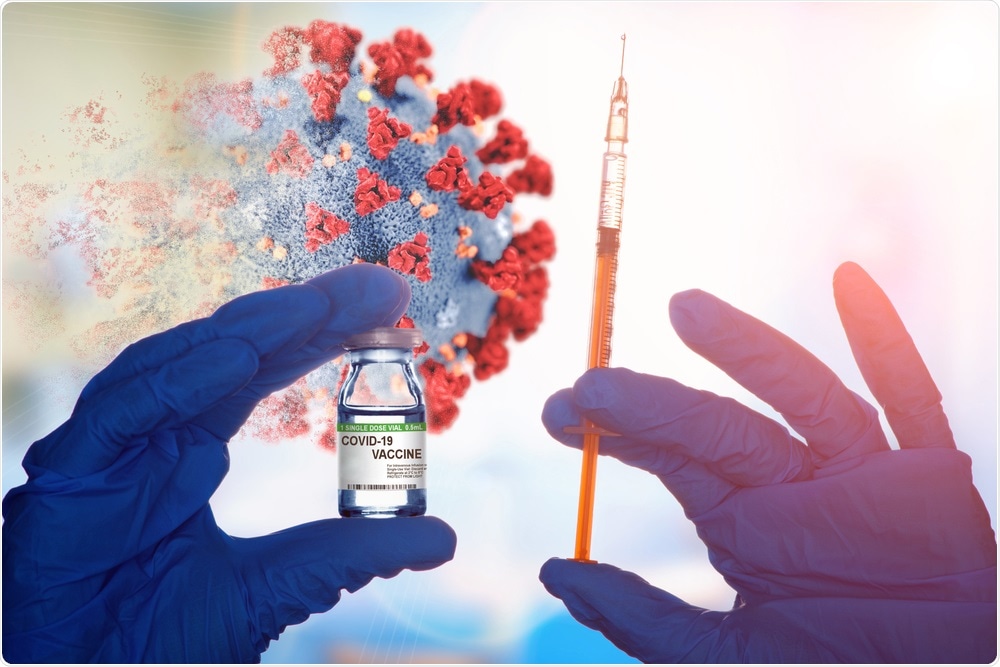Vaccination efforts against coronavirus disease (COVID-19) have commenced worldwide, with over 2.5 billion doses that have been administered as of June 16, 2021.
Despite the rapid rate at which vaccines have been administered, little is known about severe acute respiratory syndrome coronavirus 2 (SARS-CoV-2) vaccine breakthrough infections (VBIs).

Study: The SARS-CoV-2 mRNA vaccine breakthrough infection phenotype includes significant symptoms, live virus shedding, and viral genetic diversity. Image Credit: Stefano Garau / Shutterstock.com
In an effort to better understand the frequency of VBIs, a team of researchers at the Uniformed Services University of the Health Sciences in Bethesda, Maryland aimed to characterize incidences of VBIs in healthy individuals. In their study, which was published in the Oxford Academic’s Clinical Infectious Diseases journal, VBIs were noted in 24 people who had previously received COVID-19 vaccines. Though none of these individuals required hospitalization, some experienced severe symptoms and were found to shed the live virus.
COVID-19 vaccination
In the United States and several other countries around the world, widespread vaccination campaigns started at the end of 2020. As of June 17, 2021, the U.S. has delivered over 375 million vaccine doses, with almost 65% of this population has received at least one dose of the COVID-19 vaccine.
Three different COVID-19 vaccine candidates have been granted Emergency Use Authorization (EUA) from the U.S. Food and Drug Administration (FDA) to protect the public against SARS-CoV-2 infections. To date, the FDA has approved two messenger RNA (mRNA) vaccines including the Pfizer/BioNTech and Moderna vaccines, as well as the Janssen vaccine that uses a disabled adenovirus,
In Phase II clinical trials, both the mRNA-1273 (Moderna) and BNT162b2 (Pfizer/BioNtech) mRNA vaccines successfully prevented severe COVID-19 cases after the volunteers received their second dose. Due to the comprehensive review of the vaccines during clinical trials, which included determining potential side effects of the vaccine and clinical outcomes, these vaccines have since been deemed safe and effective.
However, it remains unclear whether SARS-CoV-2 VBIs are tied to severe symptoms that may interfere with daily activities and work. Previously published data has found a reduced viral load to be present in VBIs. However, it remains unknown whether live virus shedding happens during these infections, which may increase the risk of viral transmission to others.
Characterization of SARS-CoV-2 VBI
The researchers presented an extensive clinical, serological, and virological characterization of SARS-CoV-2 VBIs among people enrolled in a group of U.S. Military Health System (MHS) beneficiaries in the current study. The study focused on the functional effect of VBIs as well as the detection of infectious viruses in SARS-CoV-2 infections among individuals who were previously vaccinated.
MHS beneficiaries with a positive SARS-CoV-2 test, a COVID-19-like illness, or a high-risk SARS-CoV-2 exposure were included in this study. The team also assessed the participants with a positive polymerase chain reaction (PCR) COVID-19 diagnosis that occurred at a minimum of 14 days after receiving the final dose of the COVID-19 vaccine.
The researchers evaluated the clinical and functional outcomes of the VBIs, as well as the severity of the participants’ symptoms through questionnaires. The participants’ personal and household infection risks were also measured. The team collected nasopharyngeal swabs that were evaluated via viral culture, quantitative PCR (qPCR), and SARS-CoV-2 whole-genome sequencing to assess viral shedding. Antibodies for SARS-CoV-2 were also measured.
The researchers found a total of 24 VBIs that occurred about 14 days after receiving their final dose of the COVID-19 vaccine, with an average illness onset of 50.5 days. About 67% of the VBIs were found to develop in healthy individuals who did not have any underlying comorbidities. Notably, most of the individuals who were infected reported adhering to infection control measures like staying six feet away from people in public more than half the time.
Most of the participants reported that they reside with children or another adult. Although none of the VBIs required hospitalization, 14% reported severe symptoms that lasted for about two weeks.
Of the 22 cases whose upper respiratory tract specimens were tested via PCR, 13 were found to be positive by qPCR with a ribonucleic acid (RNA) abundance of 1.08 x 104 GE/reaction. Ten of these patients had their specimens genotyped and were found to contain the genetic material from three different variants of concern, including the B.1.1.7, P.1, and B.1.429 SARS-CoV-2 strains.
In viral culture, six positive cases had viral loads of 113,200, 4130 PFU/ml on specimens that were collected between days 6 to 7 after symptom onset.
“We observed live virus shedding in VBIs as high as 4130 PFU/mL at day seven post-symptom-onset, though relatively low magnitude, the presence of infectious virus which may indicate a transmission risk.”
The researchers noted that SAR-CoV-2 post-vaccine infections predominantly occurred in those with no underlying health conditions and no immunosuppression.
“These findings offer several early insights into the clinical and viral phenotype of VBIs, including data not typically collected in clinical trials or vaccine effectiveness studies.”